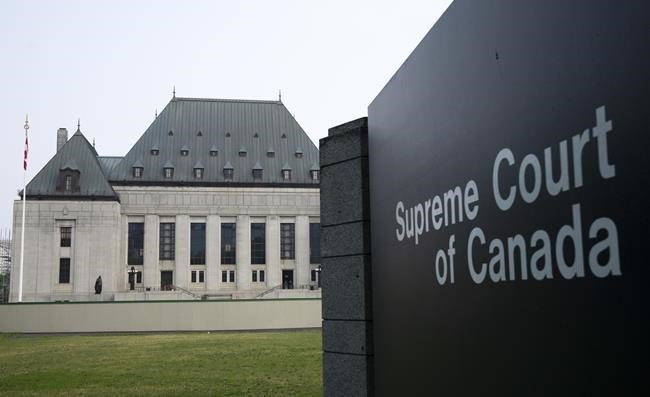OTTAWA — The Supreme Court of Canada has set aside a man's conviction for taking part in the activities of a criminal organization, saying the trial judge's instruction to the jury was insufficient.
In a 7-1 decision Friday, the top court ordered a new trial for Ahmed Abdullahi on the count in question, which stemmed from a police probe into the trafficking of illegal firearms in Ontario.
A jury found Abdullahi guilty of various firearm-related offences, and the convictions were upheld by the Ontario Court of Appeal.
However, a dissenting judge disagreed in one respect, saying the trial judge erred by failing to adequately instruct the jury on the definition of a criminal organization in the Criminal Code.
That opened the door to a hearing for Abdullahi in the Supreme Court.
His lawyers told the top court the trial judge's instruction indeed fell short, meaning there should be a new trial on the count of participating in the activities of a criminal organization for the purpose of trafficking weapons.
Writing for a majority of the Supreme Court, Justice Malcolm Rowe said the trial judge, in his charge to the jury, failed to explain that a criminal organization is one that "by virtue of its structure and continuity poses an enhanced threat to society."
The requirement distinguishes criminal organizations from other groups of offenders who act together, and helps guard against improper reasoning — notably reliance on stereotypes — as a basis for identifying such an organization, Rowe said.
"Without an explanation of this requirement in the judge's instructions, the jury was not sufficiently instructed on the legal standard to apply to the evidence in concluding that a criminal organization existed," he wrote.
"The evidence at trial, the closing arguments of counsel for the parties and the lack of objection to the charge by defence counsel could not make up for this error by the trial judge."
The case began in 2013 when police from Toronto and Ontario's provincial force opened an investigation into firearms trafficking known as "Project Traveller."
Wiretap information led police to believe Abdullahi and his associates were moving five illegal guns to Toronto from Windsor, Ont., in a rented car. Police followed a vehicle, later finding it abandoned in a Toronto parking garage. Three illegal firearms were recovered from a grocery bag on the front passenger seat.
Charges were subsequently laid against several people, including Abdullahi.
The Criminal Code defines a criminal organization as a group of three or more with a primary purpose of facilitating or committing a serious offence likely to materially benefit the group or any of its members.
It excludes a group formed randomly to immediately commit a single offence.
In his reasons, Rowe noted the Crown alleged the people heard on the wiretaps, including Abdullahi, were members of an "urban street gang" whose "turf" was a stretch of apartment buildings.
For instance, the Crown suggested the group had lookouts, escape routes to avoid arrest, places to conceal contraband and assigned roles. The prosecution also alleged that members hid their crimes by speaking Somali and using gang terminology.
Defence counsel argued there was no discussion of organizational structure in the wiretapped conversations. Rather, the evidence pointed to people from the same neighbourhood and cultural background who came together randomly.
Rowe said the purpose of the Criminal Code's criminal organization regime is to identify and undermine groups that pose an enhanced threat to society due to the institutional advantages of structure and continuity.
Such organizations have the advantage of accumulated knowledge, sharing customers and resources, developing specializations, dividing labour, fostering trust and loyalty and developing reputations in the community, including for violence, he wrote.
"These same advantages enable criminal organizations to elude law enforcement more effectively."
The trial judge's instructions did not sufficiently prepare the jury to determine whether a criminal organization existed, Rowe said.
Rather, the judge merely recited the definition in the Criminal Code.
"This would not have equipped the jury with an understanding that a criminal organization must pose an enhanced threat to society by virtue of its structure and continuity."
This report by The Canadian Press was first published July 14, 2023.
Jim Bronskill, The Canadian Press

